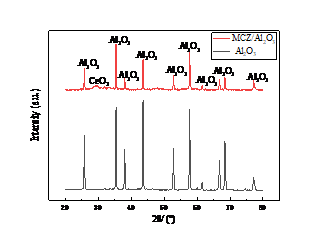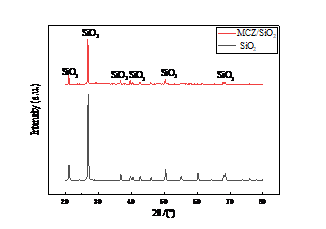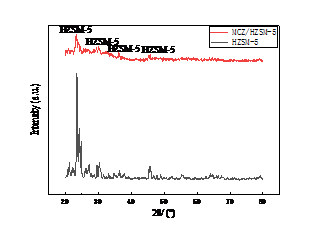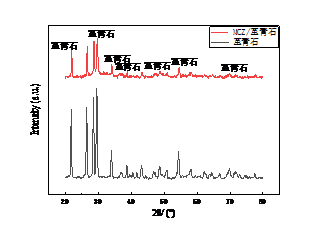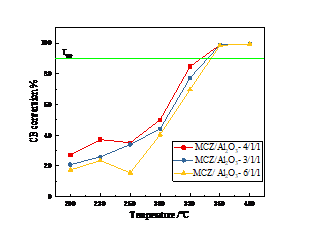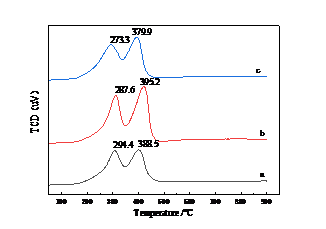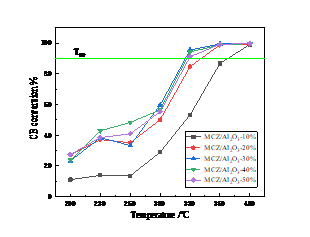载体对复合催化剂催化燃烧氯苯性能的影响毕业论文
2020-04-18 19:43:09
摘 要
本文选取四种不同载体,采用沉积-沉淀法,制备负载型Mn-Ce-Zr复合氧化物催化剂。以氯苯为模拟物,考察各载体对催化剂催化燃烧氯苯活性的影响,初步筛选出活性最优的催化剂载体,并在此载体上对制备工艺做进一步的优化。通过对活性组分摩尔配比和负载量的考察,以期获得实验范围内催化活性和稳定性最佳的负载型Mn-Ce-Zr复合氧化物催化剂。所得催化剂经X射线衍射(XRD),比表面积测定(BET),氢气程序升温还原(H2-TPR)以及扫描电镜(SEM)表征分析,研究催化剂催化性能与理化特性的内在联系。结果表明,在所研究的系列催化剂中,以Al2O3为载体、锰铈锆的摩尔配比为4:1:1、负载量为30%的复合氧化物催化剂显示出最优的氯苯催化燃烧性能,320 °C下氯苯转化率可达90%,350 °C下连续反应24 h后,氯苯转化率依然保持在99%,这与催化剂优异的氧化还原性能以及活性组分在载体上的高度分散密切相关。
关键词:载体 复合氧化物催化剂 催化燃烧 氯苯
Abstract
In this papaer,four different supports were selected to prepare supported Mn-Ce-Zr composite oxide catalyst by sedimentation-precipitation method.With chlorobenzene as the analog,the influences of various supports on the activity of chlorobenzene in catalytic combustion were investigated.The catalyst support with the best activity was selected preliminary and the preparation process was further optimized on the support.In order to obtain the supported Mn-Ce-Zr composite oxide catalyst with the best catalytic activity and stability in the experimental range,the molar ratio and load of the active component were investigated.The catalysts was characterized by X-ray diffraction (XRD),specific surface area measurement (BET),hydrogen temperature-programmed reduction (H2-TPR),and scanning electron microscope (SEM). The intrinsic relationship between catalytic performance and physicochemical properties of catalyst was studied.The results showed that the composite oxide catalyst with Al2O3 as the support,the molar ratio of manganese,cerium and zirconium being 4:1:1 and the load being 30% showed the best performance in the catallytic combustion of chlorobenze in a series of catalysts.At 320 °C,the conversion rate of chlorobenzene can reach 90%.After continuous reaction at 350°C for 24 h,the conversion rate of chlorobenzene remains at 99%.This is closely related to the excellent REDOX properties of the catalyst and the high dispersion of the active components on the support.
Keywords: support;composite oxide catalyst;catalytic combustion chlorobenzene
目录
摘 要 I
Abstract II
第一章 绪论 1
1.1. 含氯挥发性有机物简介 1
1.2. CVOCs治理 2
1.3. 催化燃烧用催化剂 3
1.4. 负载型催化剂的制备 4
1.5. 论文的研究内容 5
第二章 实验部分 7
2.1. 实验试剂和仪器 7
2.2. 催化剂的制备 8
2.2.1. 不同载体负载的催化剂制备 8
2.2.2. 活性组分不同摩尔配比催化剂的制备 9
2.2.3. 不同负载量催化剂的制备 9
2.3. 催化剂活性评价和稳定性测试 10
2.4. 催化剂结构与性能检测 11
第三章 不同载体负载对催化剂催化燃烧氯苯性能的影响 13
3.1. 引言 13
3.2. 不同载体负载的复合氧化物催化剂活性评价 13
3.3. 不同载体负载的复合氧化物催化剂的物相结构分析 15
3.3.1. 不同载体负载的复合氧化物催化剂的XRD分析 15
3.3.2. 不同载体负载的复合催化剂的BET分析 17
第四章 不同摩尔配比催化剂的制备及催化燃烧氯苯性能的研究 19
4.1. 引言 19
4.2. 不同摩尔配比催化剂的活性评价 19
4.3. 不同摩尔配比的催化剂H2-TPR分析 20
第五章 不同负载量催化剂的制备及催化降解氯苯性能的研究 23
5.1. 引言 23
5.2. 不同负载量催化剂活性评价 24
5.3. 不同负载量催化剂的物相结构和化学性能分析 25
5.3.1. 不同负载量催化剂H2-TPR分析 25
5.3.2. 不同负载量催化剂的SEM分析 26
5.4. 不同条件下制备的催化剂稳定性测试 28
第六章 结论 29
参考文献 30
致谢 33
绪论
含氯挥发性有机物简介
进入21世纪以来,伴随着工业和科技的迅速发展,环境污染带来的危害日趋严重。近二十年空气质量不断下降,粉尘、NOx等污染物浓度不断上升,对国民身心造成极大损害。其中挥发性有机物(VOCs)的污染问题尤为严峻[1]。挥发性有机物(Volatile Organic Compounds,VOCs)是指常压下沸点在50-260 oC之间,常温下饱和蒸汽压大于133.32 Pa的一类易挥发性有机化合物,它们是引起雾霾、大气光化学烟雾、温室效应和臭氧层破坏的主要诱因之一[2]。VOCs具有刺激性、高毒性、持久性、光化学反应性等特征,能够对人类健康和自然环境造成严重影响[2]。其中,含氯挥发性有机物(Chlorinated Volatile Organic Compound,CVOCs),具有很高的毒性和难降解性,其环境风险巨大,治理需求日益迫切。
以上是毕业论文大纲或资料介绍,该课题完整毕业论文、开题报告、任务书、程序设计、图纸设计等资料请添加微信获取,微信号:bysjorg。
相关图片展示:
